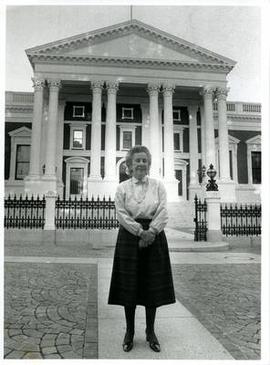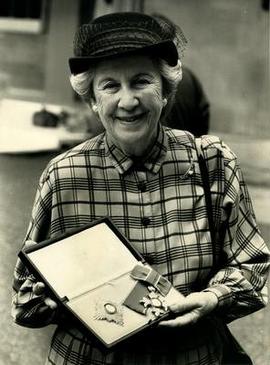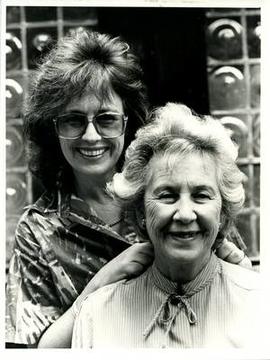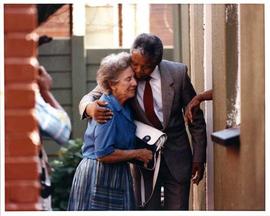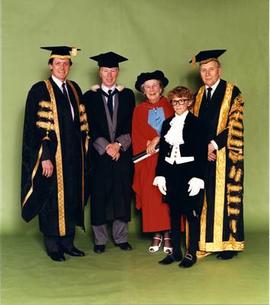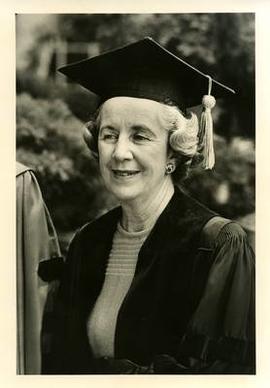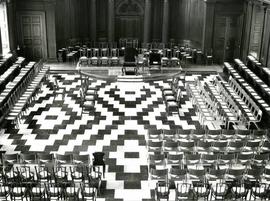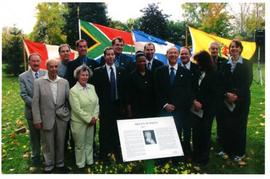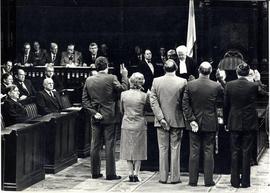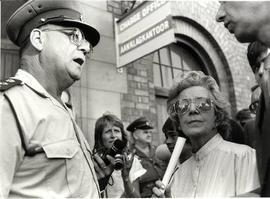Área de identidad
Código de referencia
Título
Fecha(s)
- 1944-2009 (Creación)
Nivel de descripción
Fondo
Volumen y soporte
308 boxes
Área de contexto
Nombre del productor
Historia biográfica
Helen Suzman was born Helen Gavronsky on the 7 November 1917, in Germiston, Transvaal Province. She studied Economy and Statistics at the University of the Witwatersrand. In 1937 she married Dr. Moses Suzman and they had two daughters. Between 1941 and 1944, Suzman worked as a statistician for the War Supplies Board. In 1944 she returned to the University of the Witwatersrand as a lecturer in Economic History, where she remained until 1952. During that time she joined the South African Institute of Race Relations
Suzman gave up teaching for politics when she was elected to parliament in 1953 as a member of the United Party. Six years later, when the Progressive Party (PP) was founded, she represented the Houghton constituency as that party's sole member of Parliament from 1961-1974, winning international fame for her courage and ability. She remained in Parliament with its successors, the Progressive Reform Party and then the Progressive Federal Party (PFP).
During her time in Parliament she defended the right to freedom of expression for all South Africans. As an English speaking Jewish woman in a Parliament dominated by conservative Afrikaner men she was even more of an outsider and often treated with disrespect. As a member of Parliament she was able to visit prisons, amongst them Robben Island, and inspected the living conditions of prisoners. She also visited Nelson Mandela numerous times in prison. In 1989 she retired from Parliament while remaining actively involved in South African politics. She spent a total of 36 years in Parliament.
Outside Parliament she became 'ombudsman' to the oppressed and unrepresented, and though sharply reviled by the nationalist government, she nevertheless achieved success in promoting human rights. Suzman won important changes for example in prison conditions. She campaigned against the reintroduction of the death penalty and also defended the right of women to choose on the issue of abortion.
Internationally, she has been awarded over 28 honorary degrees and nominated twice for the Nobel Peace Prize. In 1993 she published her autobiography "In no uncertain terms: A South African memoir". In 1996 she was awarded the Politeken and Dangens Nyheters Freedom Prize, jointly with Nelson and Winnie Mandela.
Helen Suzman died on the 1 January 2009, aged 91.
Institución archivística
Historia archivística
Helen Suzman deposited her papers with Historical Papers in 1989. Initially, Michelle Friedman worked on the inventory to her collection. Certain sections like 'Correspondence' have been left in the original order as filed by Helen Suzman's staff, in accordance with the archival principle of provenance, which explains why the Correspondence has been arranged by date and later by alphabetical order. Subsequently additions to the collection where processed by Anna Cunningham, Carol Archibald, Zofia Sulej and Gabriele Mohale.
The Helen Suzman Collection remained a 'work in progress' until after Helen Suzman's death in 2009. All subsequent additions following her first deposit in 1989, have been incorporated in the collection according to the initial classification of the collection.
In 2011 and again in 2013/14, with generous funding from the Oppenheimer Memorial Trust, Ruth Muller undertook a major assessment of the collection. The Finding Aid was substantially expanded, providing researchers with a much more enhanced and detailed entry point to the collection.
Origen del ingreso o transferencia
Área de contenido y estructura
Alcance y contenido
The collection consists of personal and political papers and photographs.
Valorización, destrucción y programación
Acumulaciones
Sistema de arreglo
Área de condiciones de acceso y uso
Condiciones de acceso
Permission to consult this collection must be obtained from Dr. Frances Jowell, one of Helen Suzman's daughters.
Condiciones
Copyright (for both the published works and unpublished writings by Helen Suzman) needs to be obtained from Dr. Frances Jowell.
Idioma del material
Escritura del material
Notas sobre las lenguas y escrituras
Características físicas y requisitos técnicos
Instrumentos de descripción
Uploaded finding aid
Área de materiales relacionados
Existencia y localización de originales
Existencia y localización de copias
Unidades de descripción relacionadas
Área de notas
Notas
We are extremely grateful to the Oppenheimer Memorial Trust, whose generous support and assistance has:
-
Enabled the digitisation of the Helen Suzman Collection for long-term preservation and access purposes; and
-
Provided for the enhancement and expansion, to item level, of the Finding Aid, thereby enriching the collection for research and access purposes and to, in the future, deliver some of the digitised material online.
The digitisation of the audio recordings in this collection was made possible by a generous grant from the Carnegie Foundation. The audio recordings may be accessed at the Historical Papers archive. Please refer to the list of digitised audio material on our website.


